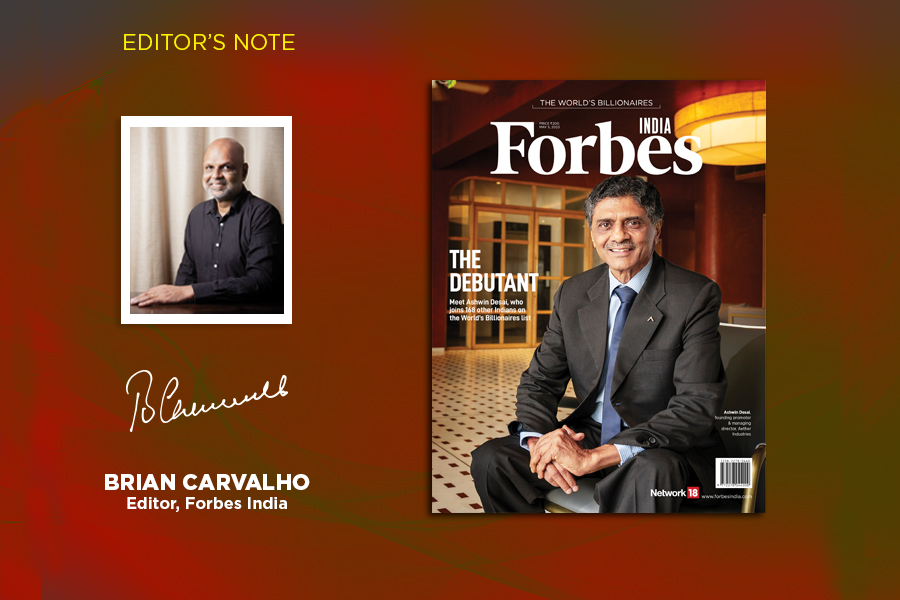By Brian Carvalho| Apr 24, 2023
A cursory glance at the Forbes list of 169 Indian billionaires suggests that it's populated by the next gen of traditional families who have seized new opportunities, along with a healthy sprinkling of first-generation tech entrepreneurs

Forbes India shines a light on billionaires not just for their super-riches but for being champions of the entrepreneurial tradition. And it’s the latter that’s been around in India from at least the 19th century.
Let’s examine this phenomenon: When writing India’s New Capitalists (first published in 2008), author Harish Damodaran ducked into Federation House, the headquarters of the Federation of Indian Chambers of Commerce and Industry (FICCI) in Lutyens’ Delhi, which has black-and-white portraits of the Federation’s presidents from 1927 onwards. “Four out of every five are from traditional merchant communities”—essentially communities including Gujarati and non-Gujarati Banias/Jains, and Marwaris and Parsis whose trading and banking networks have “historically extended over widely dispersed territories beyond their home base…” observes Damodaran. “The traditional business families form the crust of what is known in Marxist literature as the ‘national bourgeoise’.” Or perhaps India’s first ‘pan-Indian capitalist class’.
Damodaran notes that “what has been extraordinary about the Marwaris and other Hindi heartland Banias is their capacity for regeneration and throwing up fresh lots of businessmen generation after another”. Despite the ‘mixed economy’ model that India pursued post-Independence, which saw excessive policy control, the entrepreneurial tradition of the early capitalists persisted.
Then came 1991, freedom from the Licence Raj, liberalisation of a slew of sectors, from automobiles and aviation to telecom and banking, the maturing of the equity cult, the entry of foreign portfolio investors, paperless trading, and the emergence of venture capital and private equity. The rise of knowledge-based industries like software services and pharma innovation saw the arrival of a new breed of entrepreneurs from disparate families and communities, but the traditional industrial family and community, too, was able to benefit from economic reform.
It was a good mix. For instance, pre-1991, in the Licence Raj, almost all of India’s top business houses were from the traditional mercantile communities. Today, a cursory glance at the Forbes list of 169 Indian billionaires suggests that it’s populated by the next gen of traditional families who have seized new opportunities, along with a healthy sprinkling of first-generation tech entrepreneurs.
The current issue is Forbes’s annual list of the World’s Billionaires—2,640 of them—with Bernard Arnault & family, Elon Musk and Jeff Bezos taking the top three positions. One Indian features in the top 20 (Mukesh Ambani) and four more in the top 100 (Gautam Adani, Shiv Nadar, Cyrus Poonawalla and Savitri Jindal & family). The 169 from India—the country with the third highest number of billionaires on the list—are collectively worth $675 billion. The United States (735 worth $4.5 trillion) and China (including Hong Kong and Macau, with 562 billionaires worth $2 trillion) are at No. 1 and No. 2, respectively.
On the Forbes India cover is a newly-minted billionaire from Surat in Gujarat who embodies the Indian entrepreneurial tradition. Ashwin Desai founded his second specialty chemicals company, Aether Industries, when in his 60s. Now 72, Desai, who first started up with his brother-in-law in the mid-80s, took Aether public last June; today he is worth roughly $1.2 billion, courtesy the 87 percent he still holds with his family. For Desai, the billions may just be incidental. As he tells Manu Balachandran who wrote the cover story: “I never thought that I would be a billionaire. Because, at heart, I’m still a core engineer…” For more on how Desai is setting up Aether for the next phase of growth, along with sons Rohan and Aman, ‘Swimming Against the Tide’ is a must-read.
Best,
Brian Carvalho
Editor, Forbes India
Email: Brian.Carvalho@nw18.com
Twitter ID: @Brianc_Ed